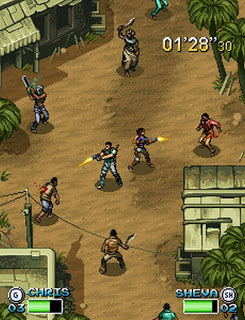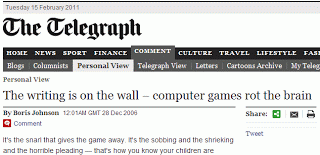This post has not been edited by the GamesBeat staff. Opinions by GamesBeat community writers do not necessarily reflect those of the staff.
No, I didn’t turn up as an applicant, yell “Do a barrel roll!” and proceed to wait patiently for my letter of acceptance. Although I may not have gone as far as yelling memes in my interview, I certainly mentioned video games. Looking back, I can’t help but think how invaluable this was at setting me apart from everyone else. After all, it’s hard to believe the two professors interviewing people for political science turned to one another at the day’s end and said, “Hey, remember that one guy who talked about politics? He was swell.”
Maybe I’m getting a little ahead of myself though. Let me explain.
At the beginning of December every year, hundreds (if not thousands) of 18- and 19-year-olds flock to Cambridge to interview for a place at its prestigious university. This task is hardly the start of their ordeal. They've already spent the past four months fraught with anxiety as the preparations for these interviews took over their lives. They've toiled over personal statements designed to convince the university of their worthiness of a place.
Somehow, I'd managed to secure myself an interview. Normally, interviewees will have a half-dozen top grades at GCSE (General Certificate of Secondary Education, or the compulsory exams every British child takes at the age of 16). I had just two.
I was surrounded by students from some of the best schools in the country. The first girl I spoke to came from a school formerly attended by the now Deputy Prime Minister Nick Clegg. At lunch, I sat with someone who'd attended a school where every single lesson was taught in French. Despite how friendly literally everyone there was, it was hard to not feel like something of an outsider.
 The main event of any prospective candidate's day at Cambridge is the interview itself. This involves speaking to two or more professors of your chosen subject. Doing a little background reading about your interviewers beforehand is advised but also absolutely terrifying. Mine were both incredibly well-regarded academics in their fields, and I was fast becoming very intimidated at the prospect of having to prove my worth to them.
The main event of any prospective candidate's day at Cambridge is the interview itself. This involves speaking to two or more professors of your chosen subject. Doing a little background reading about your interviewers beforehand is advised but also absolutely terrifying. Mine were both incredibly well-regarded academics in their fields, and I was fast becoming very intimidated at the prospect of having to prove my worth to them.
In addition to your academic background, Cambridge also likes to find out about your personality, and it was this that most terrified me. I had an image in my mind of what most people would be interested in: theatre perhaps, or maybe classical music. I, on the other hand, would rather spend an evening working my way through one of Mario's more fiendish levels. The only hobby of mine I'm truly proud of is writing. Even though I hoped I wouldn't get asked about it, I included it in my personal statement.
Two options crossed my mind when the inevitable question arose in the interview, “So what exactly do you write about?”
I could lie, pretend that I blog about something much more culturally accepted, perhaps films, or maybe politics. This would be risky. The next few questions would almost certainly revolve around my answer to this one, and unless I could do some quick lying (hint: I couldn't) I was going to trip up quickly and painfully. I decided to tell the truth, “To be honest, I do a lot of writing about video games.”
I know I shouldn't have been ashamed about admitting this. Video game journalism has never been as good as it is now, with the likes of Randy Smith, Matthew Burns, Clint Hocking, and hundreds of talented Bitmob posters critiquing games in ways which would have been impossible just five years ago. However, they didn't know that. As far as they were likely concerned, video games are, and have always been, nothing more than shallow entertainment that is designed and enjoyed solely by children, the socially inept, and the sun-averse. Despite the widespread media attention given to popular games of late, classical games are still relegated to half page "review" sections and the occasional scare story in our national papers.
Their disappointment was obvious when they heard my response. Yet, the line of questioning continued — perhaps not out of their own curiosity but due merely to the requirements of the situation. At first, they seemed utterly perplexed by the idea. What could, they wondered aloud, anyone have to write about video games? I almost struggled to answer the question; the potential answers were numerous. Should I bring up discussions on game design philosophy or the personal stories of people's lives entwined with gaming? Would it be worth mentioning the "games as art" debate (one which may have grown stale to anyone within the industry but might still interest an outsider)?
As is always the case though, all of these tropics flew right out of my mind the moment the question was asked, leaving me to stutter out a brief reply about how games can be critiqued in much the same way as books or film.
Amazingly, and against all my expectations, their interest remained. They asked for specific example, so I told them about Ico. They pressed further and I waxed lyrical about the wonders of blogs for bringing about so much aggressive debate.
The interview was soon over. We rose, shook hands, and parted after exchanging words of thanks.
“Thank you for the education,” one of them said.
“Well, thank you for not dismissing it as a juvenile hobby,” I replied.
I don't know if there's a moral to this story. Maybe I'm still utterly floored after getting a place, and I wanted to perform the Internet version of the celebratory jump. Maybe this article came about simply because over these past few months I’ve been able to play less, and thus I have less to write about. Maybe though, the fact that two academics were willing to sit and have a serious discussion about video games has filled me with a sort of confidence that I hope others can share. Maybe the next time a stranger asks what I like to do in my spare time, I'll proudly reply, “I like to write about video games.”




